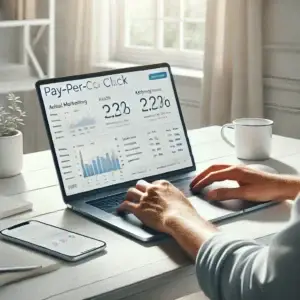The Ultimate Guide to Pay-Per-Click Advertising (PPC): A Smart Approach to Online Success
In today’s fast-paced digital world, businesses always seek ways to gain a competitive edge. One of the most powerful tools at their disposal is Pay-Per-Click Advertising (PPC). Whether you’re a small business owner, a marketing professional, or an entrepreneur, PPC can be a game-changer when used effectively. In this guide, we’ll dive deep into PPC, how it works, and how you can leverage it to grow your business.
What is Pay-Per-Click Advertising (PPC)?

Pay-Per-Click Advertising (PPC) is an online marketing model where advertisers pay a fee each time their ad is clicked. Essentially, instead of earning visits organically, you buy them. It’s one of the most efficient ways to attract targeted traffic and increase conversions quickly. Google Ads, Bing Ads, and social media platforms like Facebook and Instagram offer PPC advertising options that help businesses reach their ideal audience.
Pay Per Click Sites are:-
How Does Pay-Per-Click Advertising (PPC) Work?
PPC operates on a bidding system. Advertisers select specific keywords relevant to their business and bid on them. When a user searches for those keywords, search engines decide which ads appear based on factors like bid amount, ad relevance, and quality score.
Here’s a simple breakdown of how a PPC campaign works:
- Keyword Selection – Identify the best keywords that potential customers might use.
- Ad Creation – Craft compelling ad copy and design engaging visuals.
- Bidding Strategy – Set a maximum bid for each click on your ad.
- Landing Page Optimization – Ensure the page users land on is optimized for conversions.
- Performance Analysis – Monitor key metrics and optimize the campaign for better results.
Why is Pay-Per-Click Advertising (PPC) Important?
The significance of PPC advertising cannot be overstated. It allows businesses to:
- Get Immediate Results – Unlike SEO, which takes time, PPC delivers instant traffic.
- Target the Right Audience – Use demographic and behavioral data to reach the ideal customers.
- Control Ad Spend – Set daily budgets and adjust them according to performance.
- Boost Brand Awareness – Even if users don’t click your ad, visibility increases brand recognition.
Best Practices for a Successful PPC Campaign
To get the most out of PPC, follow these best practices:
- Use Long-Tail Keywords – These are more specific and have lower competition, leading to higher conversion rates.
- Write Engaging Ad Copy – Your ad should be clear, persuasive, and include a strong call to action.
- A/B Test Ads – Run different versions of your ads to see which performs best.
- Optimize Landing Pages – A well-designed landing page can improve conversion rates significantly.
- Monitor and Adjust – Regularly check your campaign metrics and tweak strategies for better performance.
Common Mistakes to Avoid in Pay-Per-Click Advertising (PPC)
Even seasoned marketers make mistakes in PPC. Here are some pitfalls to avoid:
- Ignoring Negative Keywords – These prevent your ad from appearing for irrelevant searches.
- Setting and Forgetting Campaigns – Regular optimization is crucial.
- Poor Landing Page Experience – Even the best ad can fail if the landing page is weak.
- Not Tracking Conversions – Without tracking, you won’t know which ads are working.
The Future of Pay-Per-Click Advertising (PPC)
PPC advertising continues to evolve with advancements in AI, automation, and audience targeting. Voice search, video ads, and AI-driven bidding are shaping the future of PPC. To stay ahead, businesses need to embrace new technologies and continuously refine their strategies.
Final Thoughts
Pay-Per-Click Advertising (PPC) is an essential digital marketing tool that can drive traffic, generate leads, and boost sales. However, it requires careful planning, execution, and optimization to yield the best results. By following best practices and avoiding common pitfalls, businesses can maximize their ROI and achieve their marketing goals.
If you’re looking to take your PPC strategy to the next level, start experimenting today and watch your business grow!

2 thoughts on “Pay-Per-Click Advertising (PPC)”